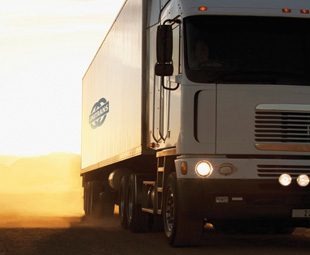Burning borders?

Road transport within Africa is no doubt a risky business. With wasted time, incidents of corruption and lost loads and vehicles, it’s expensive, too. One of the ways we can begin fighting this is to sort out the situation at the continent’s many borders. GAVIN MYERS asks how this can be achieved.
Africa is known for its many intriguing cultures, mysteries and legends; untamed jungles, wildlife and waters; searing heat; bloody conflicts; and relentless health epidemics … And, among those in the transport industry, for the overall shocking road network and poor border operations across its many states.
Thanks to much foreign investment, the road infrastructure is slowly being improved (we won’t go into the politics underlying the subject).
Namibia’s north-south B1 highway, for instance, has recently been in the news for a N$ 239-million (R238,7 million) contract awarded to Aveng Grinaker-LTA to upgrade the stretch between Windhoek and Okahandja.
It is said to be one of the most dangerous roads in that country and is being upgraded to a dual carriageway. There will be two interchanges; each with a north- and south-bound bridge, and a service road is also being constructed.
That’s the roads taken care of (at least in theory), but a much bigger problem is the border-crossing situation. It’s long been said, by many industry players and experts, that Africans are making cross-border trade and growth more difficult for themselves. As a result of the administrative, bureaucratic and/or corruption-based red tape, it takes far too long for vehicles to make their way through the various checkpoints and “roadblocks”.
This was highlighted, in November 2014, by a tragic incident at the Kasumbalesa border crossing, between Zambia and the Democratic Republic of Congo (DRC). A fire broke out when two tankers collided on the DRC side of the border post. Gasoline from one tanker leaked out and caught fire when it made contact with a wood stove in a nearby kitchen. Over 200 trucks were parked in the area at the time, 48 of which were subsequently burnt out. Four people died.
“It has been stated on many occasions, that vehicles carrying dangerous goods, when parked in congested areas at the borders, are an accident waiting to happen. This was referenced mainly to Beitbridge, between South Africa and Zimbabwe. Beitbridge has been temporarily spared such an event, and Kasumbalesa was the recipient instead,” said Barney Curtis, of the Federation of East and Southern African Road Transport Associations (Fesarta), at the time.
“The problem remains and something has to be done about it – either give dangerous-goods vehicles fast clearance, or give them a special parking area. We know that borders are congested and space is at a premium, but the stakes are too high to not make some concessions,” he continued.
Following the incident, numerous transport bodies added their opinions.
“The scale of this disaster is a wake-up call for all of us involved in moving freight across borders, whatever our role, and I believe that the implications must be dealt with at all levels. In my view, it warrants a special meeting of corridor institutions, transporters and border agencies, among others, to put urgent measure in place to minimise the risk of this kind of situation being repeated,” notes Barbara Mommen, CEO of the Maputo Corridor Logistics Initiative.
“The idea would be to pressure our respective governments to stick to relevant agreements pertaining to the transport of dangerous goods, and to ensure proper implementation of these agreements and relevant legislation.
“In addition, to implement, as a matter of urgency, special measures for the handling of dangerous-goods vehicles at our border posts. It is imperative, too, that the ministers of transport of the region provide the necessary political support to ensure that this is not repeated ever again,” she continues.
Harold Reed, executive member of the Transport Operators Association of Zimbabwe, says that the streamlining of the logistics chain needs urgent attention by African governments. “I have made this clear at every Southern African Development Community (SADC) and regional meeting that I have attended. Maybe it takes a disaster like this, which could have been avoided, to make governments sit up and take notice. It will be interesting to see the outcome.”
Reed outlines some practical steps to improve the situation: “The bottom line is that vehicles should not stand at any place, being a border post or a dry dock. Vehicles should arrive and depart.
“Standing time costs money, increases the opportunity for theft and hijacking, and, therefore, inflates transport costs, not to mention the lack of facilities that lead to major health hazards for drivers and related people.
“Border posts and dry docks should be operated on a risk-management basis only, not as a holding pen. There should be no reason, whatsoever, why a vehicle departing South Africa for the northern territories cannot proceed directly to the offloading point, with minimum delay, when it arrives in that territory. With today’s modern technology, the duties, and any other requirements, should already be in place and the loads pre-cleared.
“The question that should be raised is: Are the respective clients not using the transporters at the border posts and dry docks as convenient mobile warehouses? Once the goods are sold or required for delivery, they are conveniently released. The distributer is thus not out of pocket as far as duties are concerned. The money is already in the respective distributers’ bank accounts – at the cost of the transporter …” he notes
Both parties aim to promote dialogue and support regarding these key issues, but red tape is again getting in the way. Following the fire incident, Curtis stated that an official investigation was to be set up, and that Fesarta would follow the matter closely and work together with its member national road transport associations to determine the best way to avoid similar occurrences.
At the time of writing, the Federation had not received any feedback. FOCUS also approached the Cross-Border Road Transport Association (CBRTA) for comment, but at the time of writing had received only promises of feedback.
We look forward to hearing back from all parties concerned, and bringing you an update. Our region depends on it.
Published by
Focus on Transport
focusmagsa




